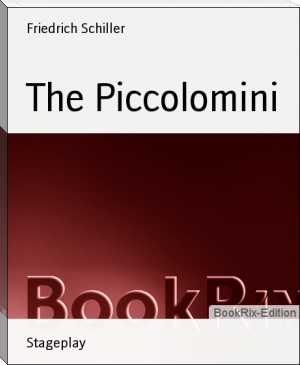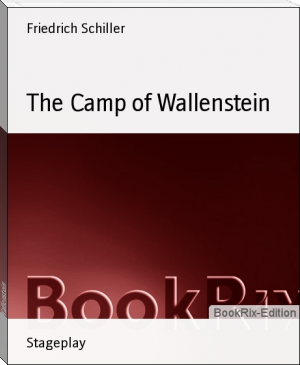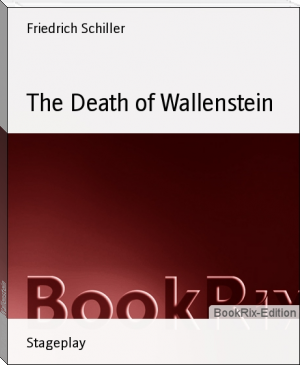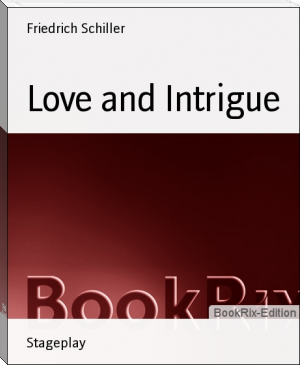The Piccolomini by Friedrich Schiller (my miracle luna book free read txt) 📕

Excerpt from the book:
Read free book «The Piccolomini by Friedrich Schiller (my miracle luna book free read txt) 📕» - read online or download for free at americanlibrarybooks.com
Download in Format:
- Author: Friedrich Schiller
Read book online «The Piccolomini by Friedrich Schiller (my miracle luna book free read txt) 📕». Author - Friedrich Schiller
these Which this same Questenberg brings hither!
BUTLER.
Ay! Those requisitions of the emperor-- I too have heard about them; but I hope The duke will not draw back a single inch!
ILLO. Not from his right most surely, unless first From office!
BUTLER (shocked and confused).
Know you aught then? You alarm me.
ISOLANI (at the same time with BUTLER, and in a hurrying voice). We should be ruined, every one of us!
ILLO. Yonder I see our worthy friend [spoken with a sneer] approaching With the Lieutenant-General Piccolomini.
BUTLER (shaking his head significantly). I fear we shall not go hence as we came.
SCENE II.
Enter OCTAVIO PICCOLOMINI and QUESTENBERG.
OCTAVIO (still in the distance). Ay! ah! more still! Still more new visitors! Acknowledge, friend! that never was a camp, Which held at once so many heads of heroes.
QUESTENBERG. Let none approach a camp of Friedland's troops Who dares to think unworthily of war; E'en I myself had nigh forgot its evils When I surveyed that lofty soul of order, By which, while it destroys the world--itself Maintains the greatness which itself created.
OCTAVIO (approaching nearer). Welcome, Count Isolani!
ISOLANI.
My noble brother! Even now am I arrived; it has been else my duty----
OCTAVIO. And Colonel Butler--trust me, I rejoice Thus to renew acquaintance with a man Whose worth and services I know and honor. See, see, my friend! There might we place at once before our eyes The sum of war's whole trade and mystery--
[To QUESTENBERG, presenting BUTLER and ISOLANI at the same time
to him.
These two the total sum--strength and despatch.
QUESTENBERG (to OCTAVIO). And lo! betwixt them both, experienced prudence!
OCTAVIO (presenting QUESTENBERG to BUTLER and ISOLANI). The Chamberlain and War-Commissioner Questenberg. The bearer of the emperor's behests,-- The long-tried friend and patron of all soldiers, We honor in this noble visitor.
[Universal silence.
ILLO (moving towards QUESTENBERG). 'Tis not the first time, noble minister, You've shown our camp this honor.
QUESTENBERG.
Once before I stood beside these colors.
ILLO. Perchance too you remember where that was; It was at Znaeim [4] in Moravia, where You did present yourself upon the part Of the emperor to supplicate our duke That he would straight assume the chief command.
QUESTENBURG. To supplicate? Nay, bold general! So far extended neither my commission (At least to my own knowledge) nor my zeal.
ILLO. Well, well, then--to compel him, if you choose, I can remember me right well, Count Tilly Had suffered total rout upon the Lech. Bavaria lay all open to the enemy, Whom there was nothing to delay from pressing Onwards into the very heart of Austria. At that time you and Werdenberg appeared Before our general, storming him with prayers, And menacing the emperor's displeasure, Unless he took compassion on this wretchedness.
ISOLANI (steps up to them). Yes, yes, 'tis comprehensible enough, Wherefore with your commission of to-day, You were not all too willing to remember Your former one.
QUESTENBERG.
Why not, Count Isolani? No contradiction sure exists between them. It was the urgent business of that time To snatch Bavaria from her enemy's hand; And my commission of to-day instructs me To free her from her good friends and protectors.
ILLO. A worthy office! After with our blood We have wrested this Bohemia from the Saxon, To be swept out of it is all our thanks, The sole reward of all our hard-won victories.
QUESTENBERG. Unless that wretched land be doomed to suffer Only a change of evils, it must be Freed from the scourge alike of friend or foe.
ILLO. What? 'Twas a favorable year; the boors Can answer fresh demands already.
QUESTENBERG.
Nay, If you discourse of herds and meadow-grounds----
ISOLANI. The war maintains the war. Are the boors ruined The emperor gains so many more new soldiers.
QUESTENBERG. And is the poorer by even so many subjects.
ISOLANI. Poh! we are all his subjects.
QUESTENBERG. Yet with a difference, general! The one fill With profitable industry the purse, The others are well skilled to empty it. The sword has made the emperor poor; the plough Must reinvigorate his resources.
ISOLANI.
Sure! Times are not yet so bad. Methinks I see
[Examining with his eye the dress and ornaments of QUESTENBERG. Good store of gold that still remains uncoined.
QUESTENBERG. Thank Heaven! that means have been found out to hide Some little from the fingers of the Croats.
ILLO. There! The Stawata and the Martinitz, On whom the emperor heaps his gifts and graces, To the heart-burning of all good Bohemians-- Those minions of court favor, those court harpies, Who fatten on the wrecks of citizens Driven from their house and home--who reap no harvests Save in the general calamity-- Who now, with kingly pomp, insult and mock The desolation of their country--these, Let these, and such as these, support the war, The fatal war, which they alone enkindled!
BUTLER. And those state-parasites, who have their feet So constantly beneath the emperor's table, Who cannot let a benefice fall, but they Snap at it with dogs' hunger--they, forsooth, Would pare the soldiers bread and cross his reckoning!
ISOLANI. My life long will it anger me to think, How when I went to court seven years ago, To see about new horses for our regiment, How from one antechamber to another They dragged me on and left me by the hour To kick my heels among a crowd of simpering Feast-fattened slaves, as if I had come thither A mendicant suitor for the crumbs of favor That fell beneath their tables. And, at last, Whom should they send me but a Capuchin! Straight I began to muster up my sins For absolution--but no such luck for me! This was the man, this Capuchin, with whom I was to treat concerning the army horses! And I was forced at last to quit the field, The business unaccomplished. Afterwards The duke procured me in three days what I Could not obtain in thirty at Vienna.
QUESTENBERG. Yes, yes! your travelling bills soon found their way to us! Too well I know we have still accounts to settle.
ILLO. War is violent trade; one cannot always Finish one's work by soft means; every trifle Must not be blackened into sacrilege. If we should wait till you, in solemn council, With due deliberation had selected The smallest out of four-and-twenty evils, I' faith we should wait long-- "Dash! and through with it!" That's the better watchword. Then after come what may come. 'Tis man's nature To make the best of a bad thing once past. A bitter and perplexed "what shall I do?" Is worse to man than worst necessity.
QUESTENBERG. Ay, doubtless, it is true; the duke does spare us The troublesome task of choosing.
BUTLER.
Yes, the duke Cares with a father's feelings for his troops; But how the emperor feels for us, we see.
QUESTENBERG. His cares and feelings all ranks share alike, Nor will he offer one up to another.
ISOLANI. And therefore thrusts he us into the deserts As beasts of prey, that so he may preserve His dear sheep fattening in his fields at home.
QUESTENBERG (with a sneer). Count! this comparison you make, not I.
ILLO. Why, were we all the court supposes us 'Twere dangerous, sure, to give us liberty.
QUESTENBERG (gravely). You have taken liberty--it was not given you, And therefore it becomes an urgent duty To rein it in with the curbs.
ILLO. Expect to find a restive steed in us.
QUESTENBERG. A better rider may be found to rule it.
ILLO. He only brooks the rider who has tamed him.
QUESTENBERG. Ay, tame him once, and then a child may lead him.
ILLO. The child, we know, is found for him already.
QUESTENBERG. Be duty, sir, your study, not a name.
BUTLER (who has stood aside with PICCOLOMINI, but with visible interest
in the conversation, advances). Sir president, the emperor has in Germany A splendid host assembled; in this kingdom Full twenty thousand soldiers are cantoned, With sixteen thousand in Silesia; Ten regiments are posted on the Weser, The Rhine, and Maine; in Swabia there are six, And in Bavaria twelve, to face the Swedes; Without including in the account the garrisons Who on the frontiers hold the fortresses. This vast and mighty host is all obedient To Friedland's captains; and its brave commanders, Bred in one school, and nurtured with one milk, Are all excited by one heart and soul; They are as strangers on the soil they tread, The service is their only house and home. No zeal inspires then for their country's cause, For thousands like myself were born abroad; Nor care they for the emperor, for one half Deserting other service fled to ours, Indifferent what their banner, whether 'twere, The Double Eagle, Lily, or the Lion. Yet one sole man can rein this fiery host By equal rule, by equal love and fear; Blending the many-nationed whole in one; And like the lightning's fires securely led Down the conducting rod, e'en thus his power Rules all the mass, from guarded post to post, From where the sentry hears the Baltic roar, Or views the fertile vales of the Adige, E'en to the body-guard, who holds his watch Within the precincts of the imperial palace!
QUESTENBERG. What's the short meaning of this long harangue?
BUTLER. That the respect, the love, the confidence, Which makes us willing subjects of Duke Friedland, Are not to be transferred to the first comer That Austria's court may please to send to us. We have not yet so readily forgotten How the command came into Friedland's hands. Was it, forsooth, the emperor's majesty That gave the army ready to his hand, And only sought a leader for it? No. The army then had no existence. He, Friedland, it was who called it into being, And gave it to his sovereign--but receiving No army at his hand; nor did the emperor Give Wallenstein to us as general. No, It was from Wallenstein we first received The emperor as our master and our sovereign; And he, he only, binds us to our banners!
OCTAVIO (interposing and addressing QUESTENBERG). My noble friend, This is no more than a remembrancing That you are now in camp, and among warriors; The soldier's boldness constitutes his freedom. Could he act daringly, unless he dared Talk even so? One runs into the other. The boldness of this worthy officer,
[Pointing to BUTLER. Which now is but mistaken in its mark, Preserved, when naught but boldness could preserve it, To the emperor, his capital city, Prague, In
BUTLER.
Ay! Those requisitions of the emperor-- I too have heard about them; but I hope The duke will not draw back a single inch!
ILLO. Not from his right most surely, unless first From office!
BUTLER (shocked and confused).
Know you aught then? You alarm me.
ISOLANI (at the same time with BUTLER, and in a hurrying voice). We should be ruined, every one of us!
ILLO. Yonder I see our worthy friend [spoken with a sneer] approaching With the Lieutenant-General Piccolomini.
BUTLER (shaking his head significantly). I fear we shall not go hence as we came.
SCENE II.
Enter OCTAVIO PICCOLOMINI and QUESTENBERG.
OCTAVIO (still in the distance). Ay! ah! more still! Still more new visitors! Acknowledge, friend! that never was a camp, Which held at once so many heads of heroes.
QUESTENBERG. Let none approach a camp of Friedland's troops Who dares to think unworthily of war; E'en I myself had nigh forgot its evils When I surveyed that lofty soul of order, By which, while it destroys the world--itself Maintains the greatness which itself created.
OCTAVIO (approaching nearer). Welcome, Count Isolani!
ISOLANI.
My noble brother! Even now am I arrived; it has been else my duty----
OCTAVIO. And Colonel Butler--trust me, I rejoice Thus to renew acquaintance with a man Whose worth and services I know and honor. See, see, my friend! There might we place at once before our eyes The sum of war's whole trade and mystery--
[To QUESTENBERG, presenting BUTLER and ISOLANI at the same time
to him.
These two the total sum--strength and despatch.
QUESTENBERG (to OCTAVIO). And lo! betwixt them both, experienced prudence!
OCTAVIO (presenting QUESTENBERG to BUTLER and ISOLANI). The Chamberlain and War-Commissioner Questenberg. The bearer of the emperor's behests,-- The long-tried friend and patron of all soldiers, We honor in this noble visitor.
[Universal silence.
ILLO (moving towards QUESTENBERG). 'Tis not the first time, noble minister, You've shown our camp this honor.
QUESTENBERG.
Once before I stood beside these colors.
ILLO. Perchance too you remember where that was; It was at Znaeim [4] in Moravia, where You did present yourself upon the part Of the emperor to supplicate our duke That he would straight assume the chief command.
QUESTENBURG. To supplicate? Nay, bold general! So far extended neither my commission (At least to my own knowledge) nor my zeal.
ILLO. Well, well, then--to compel him, if you choose, I can remember me right well, Count Tilly Had suffered total rout upon the Lech. Bavaria lay all open to the enemy, Whom there was nothing to delay from pressing Onwards into the very heart of Austria. At that time you and Werdenberg appeared Before our general, storming him with prayers, And menacing the emperor's displeasure, Unless he took compassion on this wretchedness.
ISOLANI (steps up to them). Yes, yes, 'tis comprehensible enough, Wherefore with your commission of to-day, You were not all too willing to remember Your former one.
QUESTENBERG.
Why not, Count Isolani? No contradiction sure exists between them. It was the urgent business of that time To snatch Bavaria from her enemy's hand; And my commission of to-day instructs me To free her from her good friends and protectors.
ILLO. A worthy office! After with our blood We have wrested this Bohemia from the Saxon, To be swept out of it is all our thanks, The sole reward of all our hard-won victories.
QUESTENBERG. Unless that wretched land be doomed to suffer Only a change of evils, it must be Freed from the scourge alike of friend or foe.
ILLO. What? 'Twas a favorable year; the boors Can answer fresh demands already.
QUESTENBERG.
Nay, If you discourse of herds and meadow-grounds----
ISOLANI. The war maintains the war. Are the boors ruined The emperor gains so many more new soldiers.
QUESTENBERG. And is the poorer by even so many subjects.
ISOLANI. Poh! we are all his subjects.
QUESTENBERG. Yet with a difference, general! The one fill With profitable industry the purse, The others are well skilled to empty it. The sword has made the emperor poor; the plough Must reinvigorate his resources.
ISOLANI.
Sure! Times are not yet so bad. Methinks I see
[Examining with his eye the dress and ornaments of QUESTENBERG. Good store of gold that still remains uncoined.
QUESTENBERG. Thank Heaven! that means have been found out to hide Some little from the fingers of the Croats.
ILLO. There! The Stawata and the Martinitz, On whom the emperor heaps his gifts and graces, To the heart-burning of all good Bohemians-- Those minions of court favor, those court harpies, Who fatten on the wrecks of citizens Driven from their house and home--who reap no harvests Save in the general calamity-- Who now, with kingly pomp, insult and mock The desolation of their country--these, Let these, and such as these, support the war, The fatal war, which they alone enkindled!
BUTLER. And those state-parasites, who have their feet So constantly beneath the emperor's table, Who cannot let a benefice fall, but they Snap at it with dogs' hunger--they, forsooth, Would pare the soldiers bread and cross his reckoning!
ISOLANI. My life long will it anger me to think, How when I went to court seven years ago, To see about new horses for our regiment, How from one antechamber to another They dragged me on and left me by the hour To kick my heels among a crowd of simpering Feast-fattened slaves, as if I had come thither A mendicant suitor for the crumbs of favor That fell beneath their tables. And, at last, Whom should they send me but a Capuchin! Straight I began to muster up my sins For absolution--but no such luck for me! This was the man, this Capuchin, with whom I was to treat concerning the army horses! And I was forced at last to quit the field, The business unaccomplished. Afterwards The duke procured me in three days what I Could not obtain in thirty at Vienna.
QUESTENBERG. Yes, yes! your travelling bills soon found their way to us! Too well I know we have still accounts to settle.
ILLO. War is violent trade; one cannot always Finish one's work by soft means; every trifle Must not be blackened into sacrilege. If we should wait till you, in solemn council, With due deliberation had selected The smallest out of four-and-twenty evils, I' faith we should wait long-- "Dash! and through with it!" That's the better watchword. Then after come what may come. 'Tis man's nature To make the best of a bad thing once past. A bitter and perplexed "what shall I do?" Is worse to man than worst necessity.
QUESTENBERG. Ay, doubtless, it is true; the duke does spare us The troublesome task of choosing.
BUTLER.
Yes, the duke Cares with a father's feelings for his troops; But how the emperor feels for us, we see.
QUESTENBERG. His cares and feelings all ranks share alike, Nor will he offer one up to another.
ISOLANI. And therefore thrusts he us into the deserts As beasts of prey, that so he may preserve His dear sheep fattening in his fields at home.
QUESTENBERG (with a sneer). Count! this comparison you make, not I.
ILLO. Why, were we all the court supposes us 'Twere dangerous, sure, to give us liberty.
QUESTENBERG (gravely). You have taken liberty--it was not given you, And therefore it becomes an urgent duty To rein it in with the curbs.
ILLO. Expect to find a restive steed in us.
QUESTENBERG. A better rider may be found to rule it.
ILLO. He only brooks the rider who has tamed him.
QUESTENBERG. Ay, tame him once, and then a child may lead him.
ILLO. The child, we know, is found for him already.
QUESTENBERG. Be duty, sir, your study, not a name.
BUTLER (who has stood aside with PICCOLOMINI, but with visible interest
in the conversation, advances). Sir president, the emperor has in Germany A splendid host assembled; in this kingdom Full twenty thousand soldiers are cantoned, With sixteen thousand in Silesia; Ten regiments are posted on the Weser, The Rhine, and Maine; in Swabia there are six, And in Bavaria twelve, to face the Swedes; Without including in the account the garrisons Who on the frontiers hold the fortresses. This vast and mighty host is all obedient To Friedland's captains; and its brave commanders, Bred in one school, and nurtured with one milk, Are all excited by one heart and soul; They are as strangers on the soil they tread, The service is their only house and home. No zeal inspires then for their country's cause, For thousands like myself were born abroad; Nor care they for the emperor, for one half Deserting other service fled to ours, Indifferent what their banner, whether 'twere, The Double Eagle, Lily, or the Lion. Yet one sole man can rein this fiery host By equal rule, by equal love and fear; Blending the many-nationed whole in one; And like the lightning's fires securely led Down the conducting rod, e'en thus his power Rules all the mass, from guarded post to post, From where the sentry hears the Baltic roar, Or views the fertile vales of the Adige, E'en to the body-guard, who holds his watch Within the precincts of the imperial palace!
QUESTENBERG. What's the short meaning of this long harangue?
BUTLER. That the respect, the love, the confidence, Which makes us willing subjects of Duke Friedland, Are not to be transferred to the first comer That Austria's court may please to send to us. We have not yet so readily forgotten How the command came into Friedland's hands. Was it, forsooth, the emperor's majesty That gave the army ready to his hand, And only sought a leader for it? No. The army then had no existence. He, Friedland, it was who called it into being, And gave it to his sovereign--but receiving No army at his hand; nor did the emperor Give Wallenstein to us as general. No, It was from Wallenstein we first received The emperor as our master and our sovereign; And he, he only, binds us to our banners!
OCTAVIO (interposing and addressing QUESTENBERG). My noble friend, This is no more than a remembrancing That you are now in camp, and among warriors; The soldier's boldness constitutes his freedom. Could he act daringly, unless he dared Talk even so? One runs into the other. The boldness of this worthy officer,
[Pointing to BUTLER. Which now is but mistaken in its mark, Preserved, when naught but boldness could preserve it, To the emperor, his capital city, Prague, In
Free e-book: «The Piccolomini by Friedrich Schiller (my miracle luna book free read txt) 📕» - read online now on website american library books (americanlibrarybooks.com)
Similar e-books:





Comments (0)